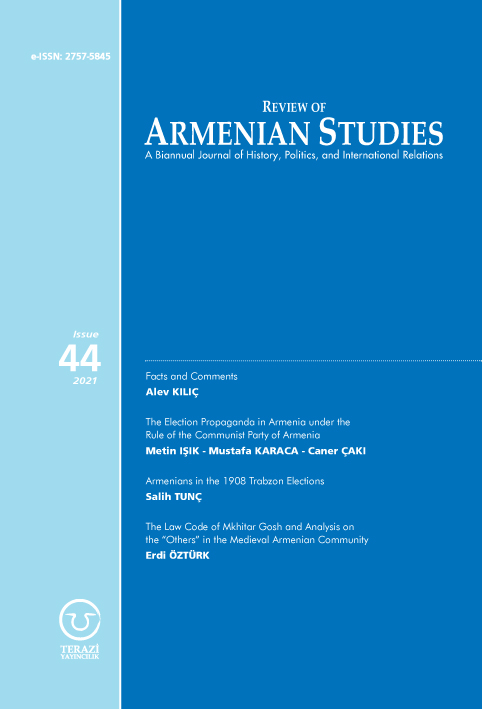Download PDF :


The newly published 44th issue of the Review of Armenian Studies journal contains 4 articles.
The first article in the 44th issue, titled “Facts and Comments” and authored by Alev Kılıç, covers Turkey-Armenia relations as well as domestic and international developments of Armenia in the period of July-December 2021. Despite Prime Minister of Armenia Nikol Pashinyan’s landslide victory in the 20 June elections, a relatively small but vociferous opposition in the Parliament, together with their militant supporters, has given Pashinyan reason to be more circumspect. Despite the aforementioned adversity in domestic politics and complexity in foreign politics that requires juggling multiple prominent actors, Pashinyan has achieved relative success and has proven to be a seasoned and populist politician. However, a daunting task remains before him; leading his people to understand that the way to prosperity and stability does not entail trying furtively to turn the clock back, but rather accepting the reality in Karabagh despite the incitement and encouragement he receives otherwise. The difficulty of this is clearly seen in Armenia’s policy of procrastination that allows the continuation of occupying Azerbaijani territory that is temporarily guarded by the Russian peacekeeping forces in the aftermath of the 2020 Karabagh war that resulted in Azerbaijani victory. The changed conditions in the region bode unprecedented opportunities for regional cooperation and stability. Unfortunately, despite Armenia’s statements to the contrary, its policy towards Turkey appears to be following the traditional pattern of submitting allegiance to certain powers and expecting rewards for availing itself to the service of those in adversity to Turkey.
In their article titled “The Election Propaganda In Armenia Under The Rule Of The Communist Party Of Armenia”, Metin Işık, Mustafa Karaca, and Caner Çakı analyze several posters from the Soviet Armenia era using the semiotic concepts of the semiotician Charles William Morris, and reveal the symbols and messages contained in the posters. To form a background for such a study, the authors offer comparisons between the purpose of holding elections in democratic and authoritarian regimes, provide a literature review of studies that touched upon issues pertaining to propaganda and authoritarian regimes, and try to succinctly explain the key points of the semiotic approach. The authors reveal that elections in the Soviet Union in general and Soviet Armenia in specific were meant to serve the Soviet Union’s need to prevent its people from forming alternative or opposing political ideas, legitimize itself by convincing the people to vote in elections whose candidates were picked by the regime based on loyalty to the regime’s ideals, and to demonstrate to its Cold War rivals that the Union was a strong political formation that enjoyed popular support.
In his article titled “Armenians In The 1908 Trabzon Elections”, Salih Tunç uses archive research and study on the relevant reports of French consulate in Trabzon to evaluate the impacts of the 1908 elections on the population of Trabzon and on the Ottoman Empire. Tunç’s evaluation reveals that the 1908 elections led to considerable disputes among Muslim and non-Muslim community based on the candidates who were chosen as deputies in the elections. Various accusations and objections were circulated against the candidates through the efforts of the Armenian Patriarchate of Istanbul, the Armenian Archbishopric of Trabzon, and the Armenian Revolutionary Federation-Dashnaktsutyun. However, the accusations and objections turned out to be unfounded, and the election disputes revealed power competition between the Armenian Church and Dashnaktsutyun, non-Muslim communities’ dissatisfaction in failing to achieve their election goals, and differences in the perspectives of various actors within the Ottoman Empire.
In his article titled “The Law Code Of Mkhitar Gosh And Analysis On The “Others” In The Medieval Armenian Community”, Erdi Öztürk sheds light on the life of the Armenian community in Anatolia during the Middle Ages and Armenian-Turkish relations based on the highly popular Law Code of Mkhitar Gosh. Gosh, a prominent Armenian scholar, priest, a statesman of the time, wrote his law code to provide both a religious and secular guide to the Armenian people. Gosh used several sources from both his own people, but also from other Christian peoples to serve as inspiration for his law code. Gosh was concerned that his people’s interactions and relations with foreigners, especially with the Muslim Turks who had established dominance in Anatolia, would lead to the erosion of Christian Armenian identity. As such, through his law code, Gosh wanted to limit his people’s interactions and relations with those who were perceived as “the others”. Despite Gosh’s efforts, it seems that Armenians nevertheless continued to interact with and be affected by “the others” throughout the Middle Ages.
To access the 44th issue, please click: https://avim.org.tr/en/Dergi/Review-Of-Armenian-Studies/44
To access the website of the Review of Armenian Studies, please click: https://avim.org.tr/en/Dergiler/Review-Of-Armenian-Studies





























